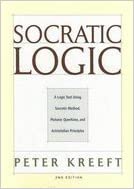St. Augustine's Press
Socratic Logic - (HC)
Socratic Logic - (HC)
Couldn't load pickup availability
The material found in this book is sorely missing in these informal logic, or critical thinking books and college courses today. The hallmark of these is to study a few fallacies and decipher their presence in articles, debates, literature, etc., with very little explanation of how these arguments are fallacious. ("Why" they are fallacious is discussed, but not "how".) Only a firm grounding in Aristotelian logic can teach you "how".
For modern critical thinkers, one of the strengths of this book (there are many) is the chapter on "Material Fallacies". Professor Kreeft includes the formal fallacies as well. He goes through 49 fallacies categorized in an intuitive order and presents them in a "commonsensical" manner- to use Professor Kreeft's word.
Now, symbolic logic is good. However, it just has to be appreciated within its proper context. Symbolic logic is a robust tool for in-depth linguistic analyses and the sciences. In contrast, Aristotelian logic is for the humanities. The author makes an excellent distinction in "Section 3: The two logics". So, if you hear some refer to Aristotle's logic as "basic logic", this may be true with respect to the sciences, but not true with respect to everyday conversation, reading, writing, debate, persuasion, presentation, etc. - all of the skills needed to be an educated person in society. No one (and this is not a knock on symbolic logic) converses with, "If p then q . . ." Symbolic logic certainly does help you on paper for in-depth analysis, but the goal is different and this difference is never stately clearly enough in the college classroom. A frequent criticism you hear about symbolic logic is that it doesn't take into account the "material" or essences of the subjects and predicates in propositions. It just focuses on forms of reasoning. Both are important and this book will provide a firm foundation for learning symbolic logic.
Share


